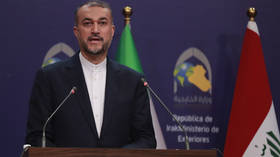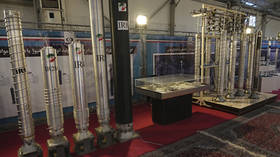Iranian FM reveals nuclear 'signals' from US

The US has signaled that it’s ready to engage with Tehran with a view to reviving the landmark 2015 nuclear deal, Iranian Foreign Minister Hossein Amir-Abdollahian said on Sunday, noting that any settlement must respect the Islamic Republic’s “red lines.”
Speaking to Al-Alam TV network, Abdollahian said Iraqi Foreign Minister Fouad Hossein, who recently returned from a trip to Washington, “carried the message that the American side is ready to conclude an agreement” on the Iranian nuclear deal.
“We have always welcomed the path of diplomacy and negotiation. We are and we have not distanced ourselves from the negotiations,” the minister stated.
Abdollahian went on to say that Tehran is ready to work toward an agreement based on the results of marathon Vienna talks to revive the 2015 deal, as well as intermediary contacts between Iran and the US.
“I imagine that if the American side behaves realistically within the framework of the message it sent and does not repeat the previous hypocritical media statements, we will not be far from an agreement,” the Iranian foreign minister said, noting that it was the American side that had deviated from its obligations under the deal in the first place.
The agreement, formally known as the Joint Comprehensive Plan of Action (JCPOA), was signed by Iran, China, Russia, the US, France, Germany, the United Kingdom and the EU in 2015. It sought to place severe restrictions on Tehran’s nuclear program in exchange for lifting sanctions. However, in 2018 the US unilaterally withdrew from the agreement, with then-President Donald Trump describing the deal as flawed.
However, the administration of US President Joe Biden has repeatedly said it is ready to engage with Iran on the matter. Subsequently, negotiations on reviving the deal kicked off in April 2021 in the Austrian capital, which resulted in hammering out the so-called “final” draft text of the agreement in August 2022.
Since then, the negotiations have stalled, however, with Washington unwilling to lift all anti-Iranian sanctions and refusing to give guarantees that it would not exit the agreement again.
Earlier this month, the US also imposed new sanctions on Iran’s petroleum industry, targeting entities that sought to bypass restrictions that had already been in place. Tehran’s foreign ministry denounced the move, portraying it as further proof of “hostility and hypocrisy” toward the nuclear accord.













